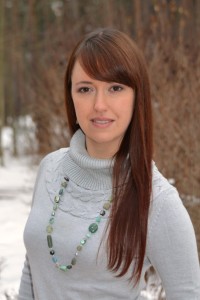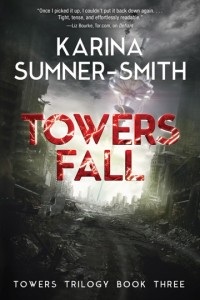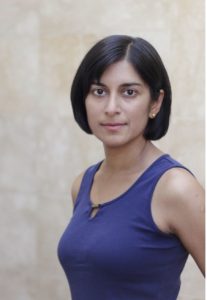 S.B. Divya is a lover of science, math, fiction, and the Oxford comma. When she isn’t designing high speed communications systems, raising her daughter, scratching the cats, or enjoying dinner with her husband, she writes. In her past, she’s used a telescope to find Orion’s nebula, scuba dived with manta rays, and climbed to the top of a thousand year old stupa. She holds degrees in Computational Neuroscience and Signal Processing, and she is currently Assistant Editor for Escape Pod. Her short stories have been published in various magazines, including Lightspeed and Daily Science Fiction, and her writing appears in the indie game Rogue Wizards.
S.B. Divya is a lover of science, math, fiction, and the Oxford comma. When she isn’t designing high speed communications systems, raising her daughter, scratching the cats, or enjoying dinner with her husband, she writes. In her past, she’s used a telescope to find Orion’s nebula, scuba dived with manta rays, and climbed to the top of a thousand year old stupa. She holds degrees in Computational Neuroscience and Signal Processing, and she is currently Assistant Editor for Escape Pod. Her short stories have been published in various magazines, including Lightspeed and Daily Science Fiction, and her writing appears in the indie game Rogue Wizards.
Her debut science-fiction novella, Runtime, was released by Tor.com Publications in May, 2016. You can find more online at www.eff-words.com or on Twitter as @divyastweets.
Is there a literary heroine on whom you imprinted as a child? A first love, a person you wanted to become as an adult, a heroic girl or woman you pretended to be on the playground at recess? Who was she?
I have two heroines for this list: Ariane Emory (from CJ Cherryh’s Cyteen) and Elizabeth Bennet (from Jane Austen’s Pride and Prejudice
). I fell in love with them in my early teens – later than the playground years, but I was busy running around at that earlier stage of my life and spent less time with books.
Ariane Emory isn’t someone you hear lauded very often even though Cyteen is Hugo-winning trilogy, maybe because she isn’t always the most likeable person in the room. Elizabeth Bennet, on the other hand, is practically a household name these days, but when I got to know her, she was an obscure character from a “required reading” book that most of my peers seemed to abhor.
Can you remember what it was these women did or what qualities they had that captured your affections and your imagination so strongly?
What drew me to both of these heroines is that they, like me, didn’t fit in with the mainstream. Ariane Emory is the clone of a genius scientist, raised with great privilege and loaded with expectations. She rises to the occasion, but in the process, she learns to embrace her individuality and use her intellect to her advantage. I certainly identified with her adolescent angst and her exclusion from general society – I was a top-of-the-class nerd, intended science major, and never quite fit in, either – and I admired her confidence and ownership of her capabilities. Those were two personality traits I didn’t possess.
Elizabeth Bennet isn’t as far removed from general society as Ariane Emory, but she’s also very intelligent, perceptive, and willing to rebel against the standard model of woman in her times. She’s more interested in the qualities of mind and heart than in fashion or status. She’s quick witted, something I desperately wanted to emulate as a pre-teen, and much like Lizzie, I had no desire to marry for money and social comfort. That may sound bland considering how popular Jane Austen is today, but at the time I read Pride and Prejudice it was my first exposure to the author, to that period and setting, and to the idea that there have always been women who resisted their expected role.
How does they compare to the female characters in your work? Are your heroines the literary ancestors of your characters? What might your creations owe them?
My main character in Runtime, Marmeg Guinto, is certainly a rebel, highly intelligent, and resourceful, so she has parallels to Ariane Emory and Elizabeth Bennet. I don’t think I’m capable of writing a female or non-binary protagonist who embraces traditional/conservative roles. I’m lucky that I came across examples of similar heroines at a formative age.
Unlike the two favorites listed here, my character, Marmeg, does not come from a place of privilege. As a kid, I found it romantic to have women in positions of power who could then exercise their will. That might also be an artifact of the 1980s, when feminism was just starting to hammer away at corporate and political glass ceilings. Today, I’m more interested in how we can empower women who aren’t traditionally seen as heroic.
I’m also more class conscious as an adult, and that informs a lot of my fiction. That’s covered much more in Jane Austen’s books than in CJ Cherryh’s. I love the way Austen uses Lizzie as a lens through which to examine society, and (now that I’m thinking about it) that is definitely something I have to credit as an influence. A couple reviews have said that Runtime is as much a work of social commentary as science fiction, and I take that as a compliment.
Another facet of both heroines, but especially Ariane Emory, is their moral grayness. Both of them are flawed, and that is something that my characters exhibit, too. I believe that our flaws and our moral choices are what make us interesting human beings, so I guess it’s no surprise that my favorites are far from perfect.
Bonus round: How do you feel about the word heroine? When I embarked on these posts, I was specifically looking for female authors’ female influences, whether those women they looked up to were other writers or Anne of Green Gables. Does the word heroine have a purpose that isn’t served by equally well by hero?
I don’t love gendered nouns, and I’m trying to break the habit of using them, but they can serve a purpose when you’re trying to highlight the treatment of women. For the word heroine specifically, I think it evokes a particular image – that of the Strong Female Character. Saying that a story has a woman or girl as the main character feels different than saying it has a heroine, in part because of the mythos associated with the root concept of a hero. A heroine by association must be active, in control of herself (as much as anyone is), and destined for greatness.
About this post: The Heroine Question is my name for a series of short interviews with (mostly) female writers about their favorite characters and literary influences. Clicking the link will allow you to browse all the other interviews, with awesome people like J. Kathleen Cheney, Linda Nagata, and Kay Kenyon. If you prefer something more in the way of an actual index, it’s here.




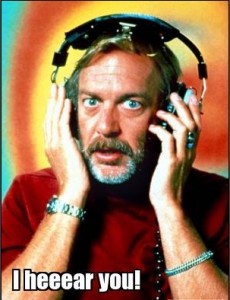
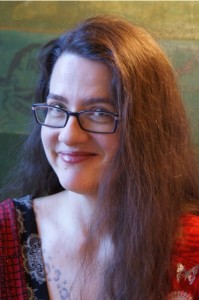

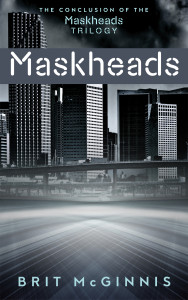 cGinnis
cGinnis